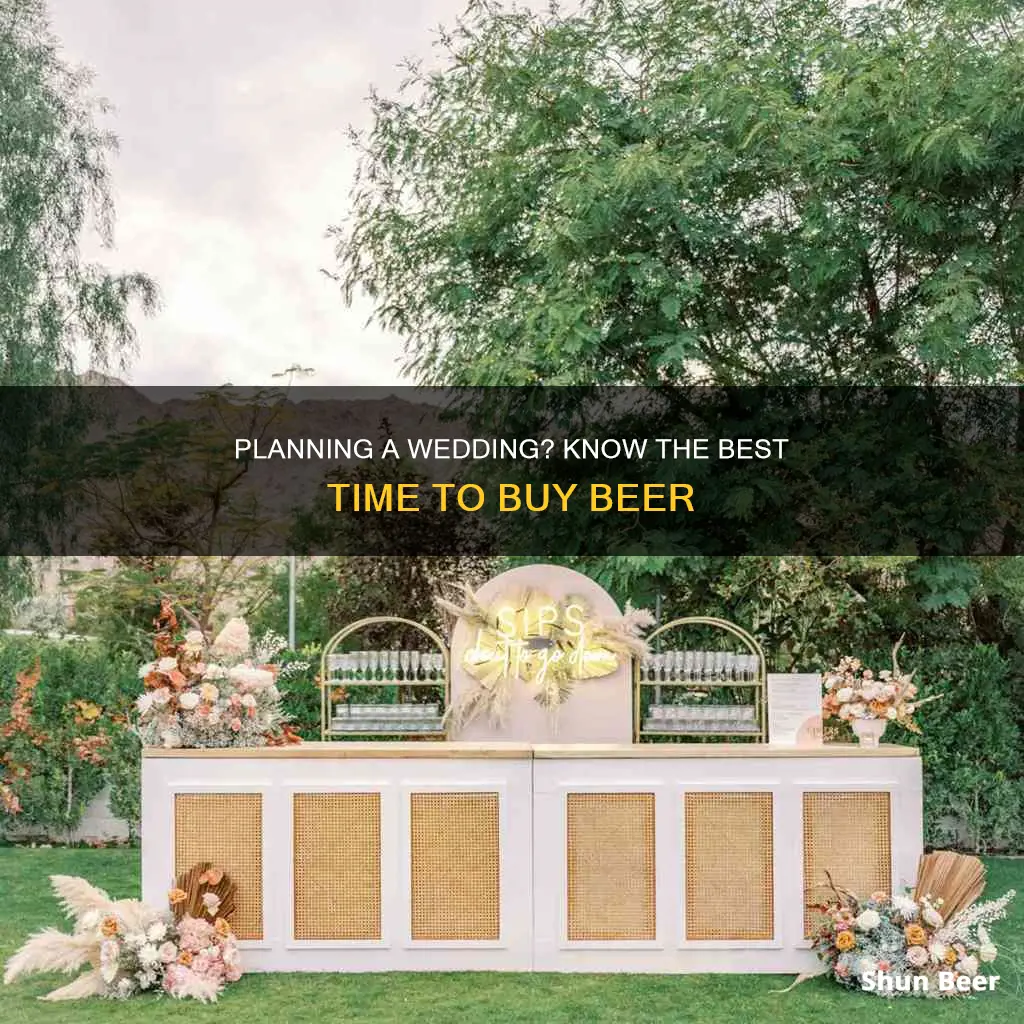
Planning a wedding can be stressful, especially when it comes to stocking the bar. The first thing to consider is the type of bar you want at your wedding. A full bar is traditionally defined as having beer and wine with several selections of each, plus liquor for cocktails, complete with mixers, fruits, and garnishes. A limited bar offers fewer options, such as beer and wine only, or beer, wine, and a signature cocktail or two. Once you've decided on the type of bar, you can start calculating how much alcohol you'll need. This will depend on factors such as the number of guests, the duration of the reception, and the drinking habits of your guests. A good rule of thumb is to assume each guest will consume one drink per hour or about five drinks throughout the evening. When it comes to beer specifically, you'll want to consider the format, whether that's kegs, bottles, or cans, and choose the option that best suits your preferences and the bar environment you want to create. It's generally recommended to buy a little extra to avoid running out, and you can always stock your home bar with any leftovers.
| Characteristics | Values |
|---|---|
| How much beer to buy | This depends on the number of guests, the duration of the reception, and the drinking habits of the guests. A good rule of thumb is to assume each guest will have at least 4-5 drinks. For a 150-person reception that lasts 5 hours, you would need around 750 drinks. If beer is the only drink being served, this would translate to six kegs or nearly 30 24-packs of bottles or cans. |
| Type of beer | It is recommended to offer a range of beers to cater to different tastes, including domestic and imported beers, light and fairly light options, and craft beers. Some popular options include Bud/Bud Light, Coors/Coors Light, Corona, Stella Artois, and IPAs. |
| Where to buy beer | Beer can be purchased from liquor retailers, club stores (like BJs, Costco, or Sam's Club), or directly from craft breweries. |
| When to buy beer | It is best to wait until you have the final guest count before purchasing alcohol. Ideally, the order should be placed or the beer picked up at least three weeks before the wedding. |
What You'll Learn

How much beer to buy
There are many factors to consider when determining how much beer to buy for a wedding. Firstly, it's important to know the number of guests and their drinking preferences. Review the guest list, noting who drinks alcohol and who doesn't due to age, religious reasons, pregnancy, or other factors. This will give you an estimate of how many guests will be drinking beer.
Next, consider the duration of the reception. The longer the event, the more drinks each guest is likely to consume. It's generally estimated that each guest will have around 4-5 drinks over the course of the evening, with the rate of consumption higher in the earlier part of the event.
The type of bar you choose to have at your wedding will also impact the amount of beer you need to buy. If you opt for an open bar, you'll need a larger quantity of beer, as guests can drink as much as they want without limit. For a beer-and-wine-only bar, you may need less beer if you also offer a range of wine options.
To help with calculations, here are some drink quantity guidelines:
- 750 ml bottle of champagne = 6 drinks
- 750 ml bottle of wine = 5 drinks (5 oz)
- 750 ml bottle of liquor = 14 drinks (1.75 oz measure)
- 1L bottle of liquor = 19 drinks (1.75 oz measure)
- Beer keg (5 gallons) = 53 glasses (12 oz)
- A case of wine contains 12 bottles.
- A case of beer contains 24 bottles or cans.
Additionally, the recommended mix of alcohol for a wedding is 50% liquor, 25% beer, and 25% wine. However, if you know your guests are primarily beer drinkers, you can adjust this ratio to suit their preferences.
As a general rule, it's better to overestimate and have some leftover beer than to run out during the event. You can always stock your home bar with any extras!
Moroccan Beer: Where to Buy and What to Know
You may want to see also

When to buy it
When to buy beer for your wedding depends on a few factors.
Firstly, it's important to know how many guests will be in attendance and how many of them will be drinking. It's also worth noting that some guests may not drink as much as others, so it's a good idea to have a range of options available. As a rule of thumb, it's generally recommended that you provide at least one drink per guest per hour. So, for a 5-hour reception with 150 guests, you would need around 750 drinks.
If you're serving other alcoholic drinks in addition to beer, you'll need to calculate how many of each drink you'll need. A common ratio is 50% wine, 30% liquor, and 20% beer. However, this can be adjusted to suit the preferences of your guests. For example, if you know you're inviting mostly beer drinkers, you can skew the numbers in that direction.
It's also important to consider the time and date of your wedding. Guests may drink less at a daytime or Sunday wedding than they would on a Saturday night. The season can also play a factor, as people tend to drink more white wine and beer in warmer months and more red wine in cooler months.
Once you've calculated how much beer you'll need, it's time to start shopping. It's best to wait until you have your final guest count to purchase your alcohol. Ideally, you should place your order or pick up the beer at least three weeks before the wedding. This will give you enough time to stock your bar and chill the drinks if necessary.
If you're buying in bulk, you may be able to get a discount from club stores or retailers that offer deals on large orders. You can also check with local craft breweries, as they may be willing to sell you kegs, cans, or bottles directly.
Remember, it's always better to have a little extra than to run out, so don't be afraid to overestimate your needs. You can always stock your home bar with any leftovers!
When Can I Buy Beer at Wegmans?
You may want to see also

How to serve it
So, you've decided to serve beer at your wedding – now it's time to think about how to serve it. Here are some tips to help you navigate serving beer at your wedding:
Choose the Right Beer
The craft beer movement has led to a wide variety of beer options available on the market. To help you choose the right beer for your wedding, consider selecting a few different varieties to cater to different taste buds. If you're serving a signature cocktail or wine, you may not need as many beer choices. However, if you're a craft beer enthusiast and want to showcase your love of brews, you can offer multiple options that cater to different flavour profiles. Rikki Welz from Iron Horse Brewery recommends starting with your favourite beers or those that hold a special meaning for you and your partner. Additionally, opt for something lean and fairly light, with light to moderate bitterness and sweetness, and an ABV of 6% or less. Examples include cream ales, blonde ales, pilsners, and Mexican/Czech/German-style lagers.
Decide on the Serving Method
The next step is to consider how you want to serve the beer. Will it be on tap, in bottles, or cans? Think about your personal preference, aesthetics, and the bar environment you want to create. For example, if you plan on having a packed dance floor, glass bottles may not be the best choice. The good news is that there isn't a significant cost difference between kegs, bottles, and cans, so you can choose the option that best suits your preferences and wedding style.
Calculate the Right Amount
To ensure you have enough beer for your guests, it's better to err on the side of having a little extra. As a rule of thumb, assume that each guest will consume about one drink per hour. For a 150-person reception that lasts 5 hours, you'd need around 750 drinks. If you're only serving beer, this could translate to up to six kegs or nearly 30 24-packs of bottles or cans. While this calculation may be excessive, especially if you offer other drink options, it's better to overestimate than run out. Any extra beer can always be used to stock your bar at home after the wedding!
Source the Beer
You can typically buy beer in bulk at your local craft brewery, but this may depend on your location and the brewery's policies. Call around to check your options, and don't forget to ask about kegs if you're planning to serve a large volume. Some breweries will allow you to purchase cans, bottles, and kegs directly from their taproom. When it comes to bulk purchasing, club stores like BJs, Costco, or Sam's Club can also be a great option.
Hire Staff
Unless your venue includes staff that can assist with bartending, you'll likely need to hire bartenders. As a rule of thumb, for a wedding of fewer than 100 people, two bartenders are usually sufficient, while for a larger wedding of 200-300 people, it's recommended to have four bartenders. Bartenders are typically paid by the hour, with rates ranging from $15 to $30 per hour.
Don't Forget the Mixers
In addition to beer, provide enough mixers for your guests, especially if you're offering cocktails. Popular mixers include tonic, club soda, ginger ale, soda, and juices like orange, cranberry, and pineapple. Don't forget garnishes like lemon and lime slices, too!
Where to Buy Puppers Beer?
You may want to see also

What types of beer to buy
When it comes to choosing the types of beer to buy for a wedding, it's important to consider the guests' preferences, the theme of the wedding, and the desired level of variety and customisation. Here are some tips to help you select the perfect beers for your big day:
Variety of Beers:
Firstly, decide on the number of different beers you want to offer. Having a variety of options is essential to cater to different tastes. While two or three types of beer can be sufficient, expanding to four or more choices will provide a broader range for your guests. This is especially true if you have a large guest list with diverse preferences.
Popular and Familiar Beers:
It's a good idea to include some well-known and widely enjoyed beers that will cater to a larger portion of your guests. Options like Coors Light, Miller Lite, Bud Light, or Budweiser are easily recognisable and tend to be crowd-pleasers. These beers are also typically more affordable and accessible.
Craft Beers and Local Specialties:
In addition to the popular choices, consider including some craft beers or local specialties to add a unique touch to your wedding. These options can showcase your love for brews and offer something different to your guests. Look for local breweries or craft beer options that are well-regarded in your area. This approach can be especially memorable for out-of-town guests who may not have tried these local offerings before.
Light and Session Beers:
It's wise to include some lighter options, such as light lagers or session beers, for guests who prefer lower-alcohol or less filling choices. These beers are also suitable for guests who plan to drink throughout the event or want to pace themselves.
Darker Beers and Stouts:
For guests who enjoy darker, more robust flavours, consider offering a porter or stout. These beers can provide a nice contrast to the lighter options and cater to those who favour more complex flavours.
IPAs and Pale Ales:
India Pale Ales (IPAs) and Pale Ales are popular choices for craft beer enthusiasts. However, keep in mind that not everyone enjoys the strong hoppy flavours of IPAs, so they may not be as widely appreciated. If you decide to include an IPA, consider pairing it with a lighter option to balance the selection.
Seasonal and Thematic Beers:
Consider the season and theme of your wedding when choosing beers. For example, a fall wedding could feature some seasonal beers like pumpkin ales or Oktoberfest-style beers. A backyard wedding might call for more casual, refreshing options like wheat beers or fruit beers.
Personal Favourites:
Don't forget to include some of your favourite beers or those that hold a special meaning for you and your partner. This adds a personal touch to the selection and makes it more memorable.
Presentation and Service:
Finally, consider how you want to serve the beer. Bottles, cans, and kegs each have their advantages and disadvantages. Bottles and cans offer more variety, ease of service, and the ability to return any unopened packages. Kegs, on the other hand, are often more cost-effective and create less waste, but they require proper dispensing equipment and can be more challenging to manage leftovers.
D9 Beer: Where to Buy and What to Know
You may want to see also

How to calculate how much beer to buy
There are many variables to consider when calculating how much beer to buy for a wedding. The general rule of thumb is to assume that each guest will consume one drink per hour or about five drinks throughout the evening. However, this may vary depending on the guest, the duration of the event, and the type of event.
Step 1: Determine the Number of Guests
Start by reviewing your guest list and estimating how many guests will be drinking beer. Consider factors such as age, lifestyle, and religious beliefs. For example, guests under the legal drinking age, pregnant guests, or those who do not drink for religious reasons are less likely to consume beer.
Step 2: Estimate Consumption
As a general guideline, you can assume that each drinking guest will consume around 4-5 drinks throughout the event. However, this may vary depending on the duration of the reception and the drinking habits of your guests. If your guests are light drinkers, they may consume fewer drinks, while heavy drinkers may consume more.
Step 3: Calculate the Amount of Beer Needed
Once you have an estimate of the number of drinking guests and their expected consumption, you can calculate the total amount of beer needed. For example, if you have 100 guests and expect each drinking guest to consume 4 beers, you would need a total of 400 beers.
Step 4: Consider Other Factors
In addition to the number of guests and their consumption, there are other factors that can affect the amount of beer you need:
- Duration of the Reception: If your reception lasts longer than the standard 4-5 hours, you may need to increase the amount of beer to account for the extra time.
- Other Alcoholic Beverages: If you are serving other types of alcohol, such as wine or liquor, your guests may opt for those drinks instead of beer. In this case, you may need less beer.
- Season and Climate: If your wedding is during the summer or in a warmer climate, you may need more beer as guests are likely to opt for refreshing beverages.
- Type of Wedding: The style of your wedding can also impact beer consumption. For example, a casual backyard BBQ wedding may result in higher beer consumption compared to an elegant cocktail reception.
Step 5: Use a Calculator or Formula
To make the calculation easier, you can use an online wedding drink calculator or a formula. The Knot, for example, provides a wedding drink calculator that takes into account factors such as guest count, reception duration, drinking habits, and the inclusion of a champagne toast. Alternatively, you can use a formula such as the 50-30-20 ratio suggested by Zola, which recommends allocating 50% wine, 30% liquor, and 20% beer.
Step 6: Add a Buffer
It is generally recommended to overestimate rather than underestimate. You don't want to run out of beer halfway through the reception. Consider adding a buffer of 10-20% to your calculation to ensure you have enough beer for your guests.
Step 7: Choose the Right Beer
Finally, consider the type of beer you want to serve. Offer a variety of options, including canned or bottled staples and craft beers, to appeal to different tastes. If you're serving beer on tap, keep in mind that a 1/2 barrel contains about 120 16-ounce pints.
Montana Beer Laws: When Can You Buy Alcohol?
You may want to see also
Frequently asked questions
It's best to wait until you have your final guest count to purchase your alcohol, so plan to buy your beer around the time you get all your RSVPs back. In general, you'll want to have placed your order or picked up the booze at least three weeks before the big day.
This depends on a few factors, such as how many guests you have, how long the reception will be, and how many drinks you expect each guest to have. A good rule of thumb is to plan for each guest to have one drink per hour, or about five drinks throughout the evening. So, for a 150-person reception that lasts 5 hours, you’d need around 750 drinks. If beer is the only drink you're serving, this would mean up to six kegs or nearly 30 24-packs of bottles or cans.
It's important to give your guests options and consider their different tastes. You can include a mix of popular domestic brands, such as Bud Light, Coors, or Blue Moon, and imported beers, such as Corona, Stella Artois, or Heineken. IPAs are also quite popular at the moment. If you're serving a signature cocktail or wine, you may not need as many beer choices.
You can buy beer in bulk at your local craft brewery or liquor retailer, or at club stores like BJs, Costco, or Sam's Club. Many local liquor stores offer bulk rates and delivery and pick-up services, which can be very helpful.







